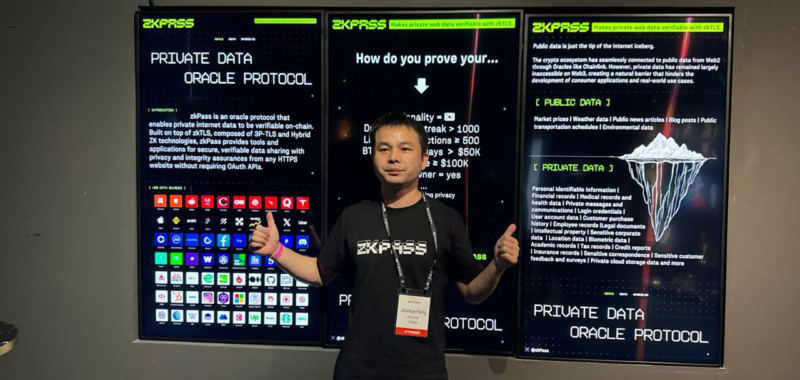Privacy is fundamentally one of the core principles of decentralization. Unfortunately, private data breaches, identity thefts, access to unsolicited information and misuse of consumer data have become standard practice in today’s business environment. Decentralized infrastructure plays a vital role in enhancing privacy. The National Public Data breach in 2024 caused immense trouble as the private data of 2.3B US citizens was leaked on the Dark Web. Beyond the sensitivity of the data, the unique aspects of the data concerned longevity, creating a significant imprint for a lifetime. Therefore, building Web3 infrastructure that can enhance data privacy is the dire need of the hour.
We recently interviewed Dr. Joshua Peng, Strategy Lead at zkPass, in person during Token2049 Singapore to explore how they’re building at the frontier of identity infrastructure where users can take complete control of their data, uplifting data sovereignty in the space. In this interview, we discussed zkPass’s journey, how the team employs Zk technology, its associated challenges, and its real-world applications.
The Evolution of ZkPass
zkPass is building a zkTLS oracle that bridges all private data in the Web3 space, including identity and banking information, to generate on-chain Web3 proofs. Essentially, they are creating a zkTLS protocol to integrate private data seamlessly.
With an engineering background and a Ph.D. in Structural Engineering and Computing from University of Missouri, Peng spent three years at Gilsanz Murray Steficek LLP, involved in the technical exploration with Hyperledger Fabric blockchain consortium. He started working on tokenizing real-world assets in 2017 before following his passion for zkPass. He shared that his inspiration for zkPass primarily came from his co-founder, who was keen to improve the real-world application of zero-knowledge technology. The team conducted several research studies to explore the implementations of Zk technology in this journey.
The zkPass infrastructure comprises zk proofs, 3P-TLS, and MPC technology to provide verifiable data sharing and privacy tools. The infrastructure goes beyond identity verification; it can also be applied to various types of data, including financial information, on-chain activity, social interactions, and skill verification on the application front. In contrast, zero-knowledge is used on the privacy-preserving side to protect the user’s privacy during verification. With zkPass, you can skip the traditional verification processes that require you to submit documents. Instead, you won’t have to share sensitive information with third parties. Peng also reiterated the business use cases of zkPass, where the technology can be adopted in different spheres of life versus the application of technology from a regulatory standpoint where some oversight is required or probably a decrypting mechanism with respect to AML or illegal activities.
Peng also reiterated the business use cases for zkPass, underlining how the technology can be applied across different sectors. From a regulatory perspective, he elaborated that some oversight may be necessary, requiring a decryption mechanism regarding issues related to AML (anti-money laundering) and illegal activities.
Real-World Applications: Where Will Technology Gain the Most Consumer Interest
As part of the conversation, Peng highlighted how zkPass can see significant traction from an application perspective. Identity solutions, specifically for proof of humanity, which can be used while distributing airdrops or assessing on-chain activity, can be a very relatable use case. Interestingly, Peng calls it “weak KYC,” where you provide a slice of personal information to platforms without completely disclosing your identity. Proof of Humanity is a system of verifying actual individuals versus fake accounts or bots. It involves verifiable online identity verification without a centralized authority.
Another application involves finance-related data bridged from Web2 to Web3, such as credit scores and financial information, which can be used in decentralized prediction markets to gauge your influence and the relevance of your judgments. In the gaming space, zkPass is collaborating with Animoca Brands to develop identity solutions that enable high-quality Web2 gamers to receive Web3 incentives based on verified Web3 proofs.
Currently, zkPass offers a Web3 extension for users and is developing a mobile app to enhance the user experience. The team is also working towards speeding up the proof generation process.
Benefits and Challenges with Zk Technology
Towards the end of the conversation, Peng shared the challenges of working with Zk technology, especially since it was still new while launching its mainnet around the same time. Initially, they utilized Zk primace circuits, but as they weren’t fully intact, his team developed the code from scratch to facilitate necessary modifications.
This approach has also contributed to their ability to accelerate proof generation processes, positioning them as one of the leading players in the Zk space.
What’s Next?
With significant product announcements and partnerships coming up in the near future, Peng is keen to establish zkPass as the” oracle of private data.” His team is committed to bridging the majority of private data from Web2 to Web3 and are keen on businesses exploring different ways of utilizing the data. zkPass is determined to build an ecosystem that advocates privacy and security, ensuring these fundamental rights are available to everyone.
Disclaimer: This article is provided for informational purposes only. It is not offered or intended to be used as legal, tax, investment, financial, or other advice.

